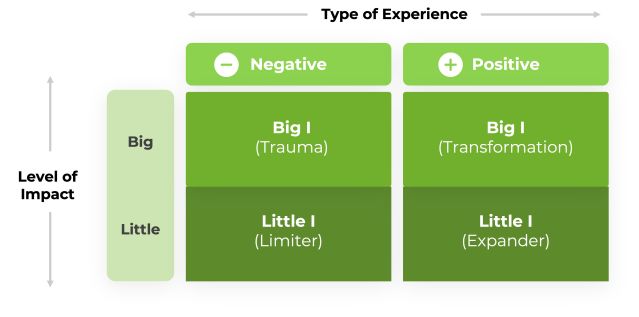Trauma
Your Childhood Traumas Can Empower Your Future Success
Difficult life experiences build strengths that can propel you forward.
Posted January 23, 2023 Reviewed by Lybi Ma
My childhood was less than ideal. My mother developed a mental illness when I was three. My father, who worked multiple jobs and was consumed by his spiritual pursuits, was rarely home. As my parents struggled to make ends meet, we bounced around from one home to another. By the time I was fifteen, I had moved sixteen times.
As paradoxical as it may sound, the same things that traumatized me early on also delivered unique gifts that I successfully use in the workplace today. My unusual upbringing led me to develop mindsets and abilities to adapt to significant uncertainty. And I’ve used these assets to address some of the most inherently ambiguous areas of business: how to run startups, manage corporate innovation, and transform organizational culture.
Once I was able to view my life experiences in a new light, I became more capable of seeing my hidden strengths. I realized I instinctively understood how to work with limited data, check assumptions, decipher unwritten rules, hedge bets, and quickly pivot in new directions.
Trauma Delivers Strengths If You Know Where to Look
Early childhood traumas can stick with us into adulthood and get in our way of achieving personal and professional goals. Traumatic experiences can be big events that create PTSD, as described by Bessel van der Kolk in his groundbreaking book The Body Keeps the Score. Or, we can have a series of small experiences that accumulate over time, like being bullied or enduring relentless criticism from a parent. Either way, our traumas can instill strengths at the same time, if we know how to uncover them.
Many of us put the past in a box, lock it up, and try to forget it’s there. The problem is that past traumas can trigger subconscious memories which result in auto-pilot responses. For example, you might get triggered by a statement from your manager that conjures up reactive emotions from being criticized as a child, which results in a defensive response that hurts your relationship, not to mention your career advancement opportunities. The other problem with ignoring the past is that you might miss the hidden strengths you’ve gained from your experiences, which means you can’t fully leverage them to advance your personal and professional goals.
Research from Richard Tedeschi on Post-Traumatic Growth reveals how “negative experiences can spur positive change, including the recognition of personal strengths, the exploration of new possibilities, improved relationships, a greater appreciation for life, and spiritual growth.” People who have endured natural disasters, bereavement, job loss, economic stress, and serious illnesses often gain insight into themselves and the world in ways that transform their lives. The opportunity is to understand how your past led to tangible strengths, not despite your traumatic experiences, but because of them.
Decode Your Experiences to Discover Hidden Strengths
There are two strategies for viewing your past:
- Gain insight into how the negative impacts of certain experiences may still linger with you today so you can overcome them
- Uncover hidden strengths that certain experiences delivered to you that can be leveraged in new, creative ways
To put your spectrum of life events into context here’s a simple way to think about and understand your experiences called the “Impact Chart.” The sources of trauma can be big significant events, as well as little things that add up over time.

Use the chart to classify your most significant experiences into the four types of Impacts (or “I’s” for short):
- “Big I” Traumas (Negative): Traumatic events or sustained experiences that had a big negative impact on how you think and feel
- “Little I” Limiters (Negative): A series of little events that might stick with you in some way that detracts from your focus, energy, or presence
- “Big I” Transformations (Positive): Significant positive experiences that transformed how you think and the direction of your life
- “Big I” Expanders (Positive): Little events that had a relatively significant positive impact on your life
It can feel empowering to consider your positive experiences when exploring the strengths you possess, like having worked with a great teacher or achieving a significant personal goal. Those can be great starting points.
But it can feel even more empowering to decode your traumas to uncover the strengths they delivered to you. For negative experiences that feel comfortable enough to contemplate, consider the following questions to uncover the assets they delivered to you:
- What attitudes and beliefs were shaped by your experiences that you can apply to achieve your future goals?
- What abilities did you develop due to your experiences that you can leverage in new or creative ways?
- What knowledge or skills did you obtain that you can use in your personal pursuits or professional life?
When you more fully understand the impact of your past on how you think, feel, and act, you increase self-awareness. And by exploring your most challenging experiences with greater intention, you can discover hidden strengths that you can use to empower your future.
References
Adapted from the book Experiential Intelligence.




